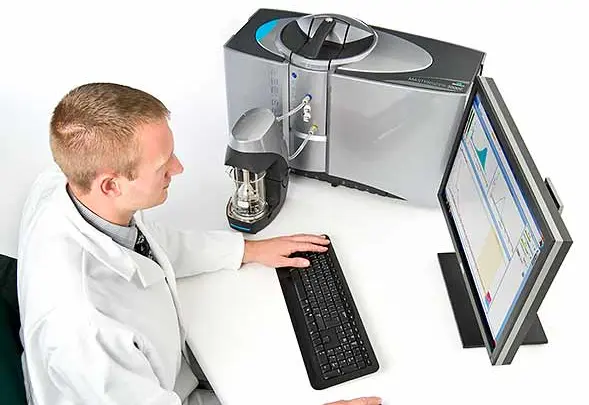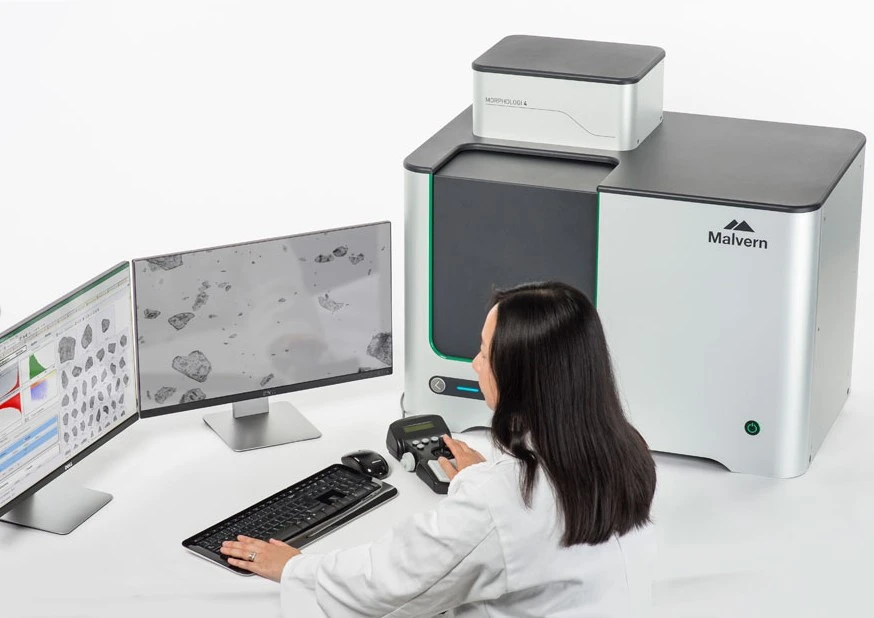Malvern Mastersizer 3000+ Lab
The Malvern Mastersizer+ Lab provides a cost-effective, entry level particle sizing system that uses laser diffraction to measure the particle size distribution with manual wet and dry dispersion, which can be upgraded to the Pro or Ultra as required.
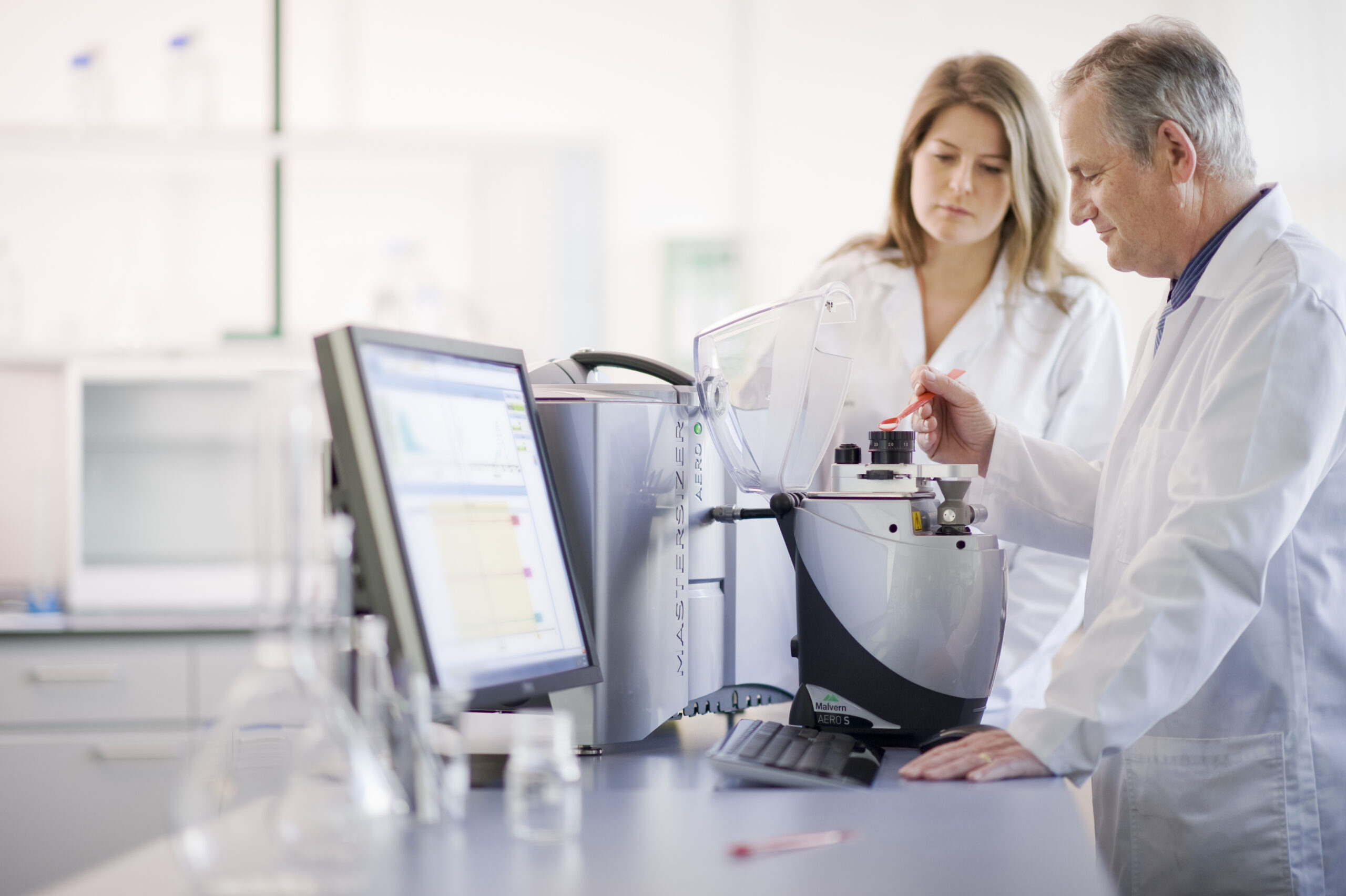


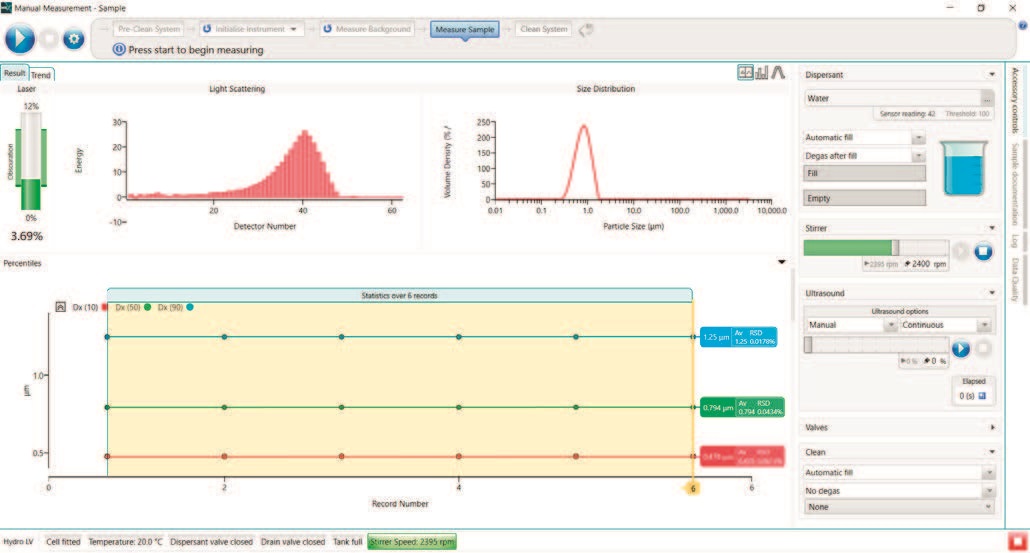
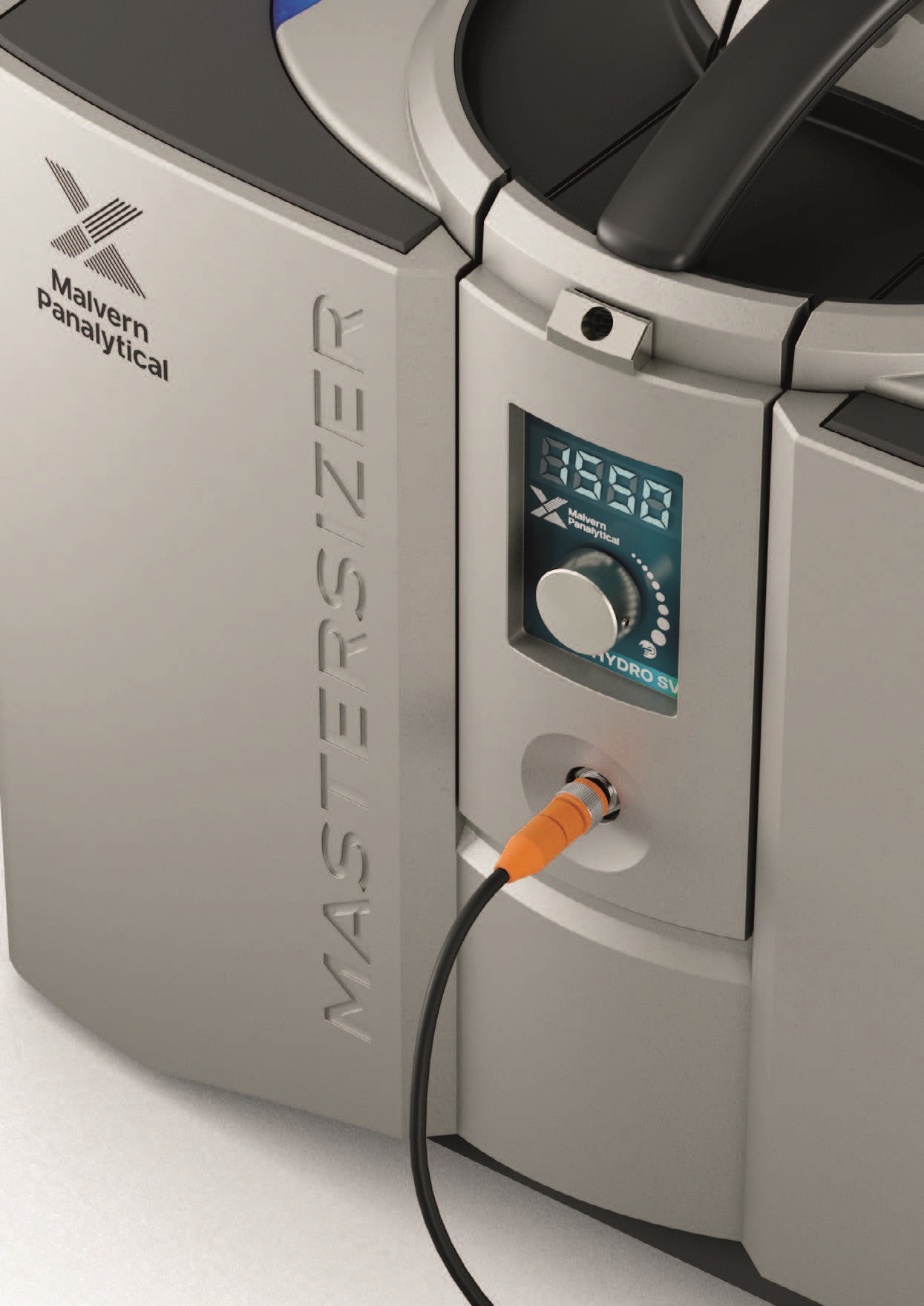
Malvern Mastersizer 3000+ Lab
The Malvern Mastersizer+ Lab provides a cost-effective, entry level particle sizing system that uses laser diffraction to measure the particle size distribution with manual wet and dry dispersion, which can be upgraded to the Pro or Ultra as required.
| Manufacturer | Malvern Panalytical |
|---|---|
| Product Series | Malvern Mastersizer |
| Measurement principle | Laser Diffraction |
| Application | Particle Size |
| Sample type | Dry powders, Suspensions, Colloids, Soils |
| Particle size range | 0.1 to 1000µm |
| Typical measurement time | <10sec |
| Accuracy | Better than 0.6% (for polystyrene latex standard) |
| Repeatability | better than 0.5% (for polystyrene latex standard) |
Product Overview
The Malvern Mastersizer 3000+ Lab provides a cost-effective entry level system that makes particle size analysis the easiest it’s ever been. Using the same class-leading hardware and easy to use Mastersizer Xplorer software in the series, Mastersizer 3000+ Lab is fast and accurate for both wet and dry dispersions. It provides data you can rely on, no matter your experience level. If requirements change it can be upgraded with added software features to the Mastersizer 3000+ Pro or Ultra.
The Mastersizer 3000+ Lab is made up of an optical bench, one or more manual sample dispersion units, an optional dispersion imaging accessory and software for instrument control and data processing. The folded optical design creates a compact system that requires very little bench space. The He-Ne 632.8nm laser enables measurements from 0.1 to 1000 microns. A rapid 10 kHz data acquisition rate and excellent reproducibility allows even highly polydisperse samples to be measured quickly and accurately.
Particle size is measured using the technique of laser diffraction. Samples are dispersed in either a liquid or an air cell. A laser beam passes through the cell and the dispersed particles scatter the light creating a scattering pattern. The optics measure the angles and intensity of the scattered light from which the particle size distribution is calculated using Mie Theory.
The Mastersizer Xplorer software controls the system during the measurement process and analyses the scattering data to calculate a particle size distribution. User guidance is provided through every stage of the measurement from method development, SOP operation to result reporting.
Quick Comparison Table
| Mastersizer 3000+ Ultra | Mastersizer 3000+ Pro | Mastersizer 3000+ Lab | |
| World leading sizing performance & AI | Robust size with advanced software | Entry level with upgrade options | |
| Particle size range | 0.01µm – 3500µm | 0.1µm – 2500µm | 0.1µm – 1000µm |
| Dispersant type | |||
| Automated wet | ✓ | ✓ | – |
| Automated dry powder | ✓ | ✓ | – |
| Manual wet | ✓ | ✓ | ✓ |
| Manual dry powder | ✓ | ✓ | ✓ |
| Software | |||
| Basic software | ✓ | ✓ | ✓ |
| Comparison software | ✓ | ✓ | – |
| Advanced method development, including SOP Architect | ✓ | ✓ | – |
| Data Quality Guidance | ✓ | ✓ | – |
| Advanced reporting | ✓ | ✓ | – |
| Size Sure mode | ✓ | – | – |
| Connectivity | |||
| Smart Manager enabled | ✓ | ✓ | ✓ |
| Compliance | |||
| Installation | IQ/OQ validation | – | – |
| Regulated environment | 21 CFR Part 11 Support | – | – |
A tale of innovation: MalvernPanalytical, is a world-leading analytical instrument company and was one of the pioneers in laser diffraction instrumentation with the release of the first instrument in 1976. Since then, a succession of ever improving instruments has culminated in the Mastersizer 3000+ Series that incorporates artificial intelligence and data-science solutions within your measurement workflows to unlock new insights in a more connected and ‘smart’ world.
- Demonstration video
- Benefits
- Applications
- Accessories
Demonstration video
Benefits
- Outstanding value with upgrade path
The Mastersizer 3000+ Lab delivers precise, robust wet and dry particle size measurements tailored to the operator’s application needs. If requirements change it can be upgraded to the Mastersizer 3000+ Pro or Ultra. - So easy to use
The software guides users through every stage of a measurement, from method development to result reporting, reducing training requirements and making particle size measurement fast and routine.
Applications
Characterisation of Battery Materials
An important aspect in the design of the battery material is the particle size and particle size distribution of the materials used within the electrodes. Small particle size electrodes increase the rate of electrochemical reactions while large larger particle sizes increase energy storage capacity. Using a mixture of coarse and fine battery materials is one way to meet the requirements for power and storage capacity.
Optimising Powder Properties used in Additive Manufacturing (AM) or 3D-printing
Particle size distribution is critical for powder bed AM processes since it affects powder bed packing and flowability which in-turn impacts on build quality and final component properties. Powder flow is a critical consideration in the manufacture of sintered products using AM. Poor flow during powder bed deposition may lead to variations in powder bed density, resulting in defects that reduce the strength of the finished part. Packing density or the way that particles pack together is a function of both their size and size distribution. Minimising voidage is also crucial to producing a flaw-free sintered component.
Particle size analysis in the Cement Industry
In a cement laboratory, traditional Blaine measurement can be a time-consuming and prone to operator variability. The Mastersizer 3000 offers highly automated particle size analysis with extremely high reproducibility and repeatability. Complete size distributions can further understanding of how certain size fractions correlate with performance which makes it possible to control and optimise milling and minimise both energy consumption and operating costs.
Measuring the particle size of foods such as dairy, margarine, chocolate, coffee, sugar etc.
Particle size measurement is essential in the development of new products, during manufacture and for final QC. Particle size distribution can affect taste, appearance, texture, processability, functionality and/or the stability of the final product.
Investigating the dispersion of Pharma dry powders and APIs
Control of particle size is critical during the formulation and manufacture of pharmaceutical products. Particle size can influence dissolution, solubility, bioavailability and stability. The unique design of the Aero S dry powder disperser avoids particle-to- wall collisions leads to gentle but effective dispersion, extending dry measurement to more fragile powders.
Importance of particle sizing of powder coatings, paint, inks and pigments
Powder coatings are dry powder polymers that contain pigments and are usually applied electrostatically as a free flowing dry powder and then heated to flow into a hard finish. Close packing of particles enables efficient melting at lower temperatures, giving more time for cross-linking reactions between polymer particles for a better finish. To produce a consistent coating the powder must be free-flowing and have a controlled particle size distribution which can be measured simply and rapidly by laser diffraction, using a dry dispersion method.
Classify soil texture using laser diffraction particle size analysis
The Mastersizer 3000 can be used in soil analysis to rapidly determine clay, silt and sand fractions to classify soil texture which as a result guides their use and efficient management.
Optimise reaction rates of catalysts
Reaction rates in solid systems are often a function of the specific surface area of the particles involved. The finer the particles, the larger their surface area to volume ratio, which promotes higher reaction rates. This is important in industries such as catalyst production, where particle size must be tailored to optimise reaction rates or ensure the effective scavenging of pollutants.
Accessories
Liquid (wet) Dispersion Units
The Hydro SV is a small volume wet sample dispersion unit. It is useful where the amount of sample is very limited, or where there are safety issues associated with the dispersant required.
- 5.6ml – 7ml dispersant volume
- High chemical compatibility
- Software controlled magnetic stirrer and wash station
- Sample retained for recovery

The Hydro EV is a unique wet sample dispersion unit with a dip-in pump and stirrer for dispersion in standard laboratory beakers. Suitable for a wide variety of dispersant volumes and particle size ranges.
- Uses 250mL, 600 mL or 1000 mL beakers.
- In-line sonication for rapid agglomerate dispersion.
- Sample recovered following analysis.
- High chemical compatibility.
- Software control of pump / stirrer and sonication.
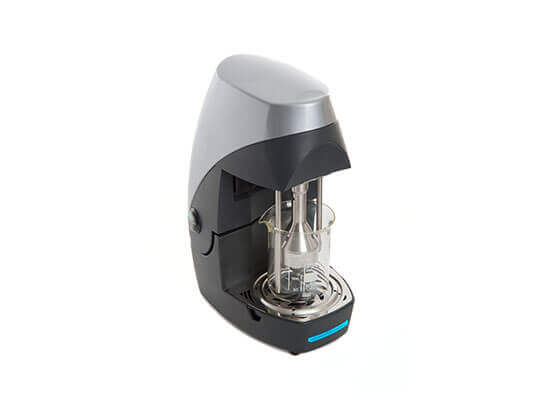
The Hydro SM is a manual wet sample dispersion unit. Designed for measuring samples in non-aqueous dispersants where solvent usage needs to be minimised. The pump and stirrer are manually controlled. Software driven SOPs with user guidance ensures GLP and reproducible measurements.
- Small sample volume from 50ml -120ml.
- Variable pump and stirrer with digital readout.
- Manual fill, drain and cleaning.
- High chemical compatibility

The Aero M manual dry powder disperser enables bulk dry powder samples to be measured. It is easy to use and maintain, delivering reproducible particle size distribution measurements.
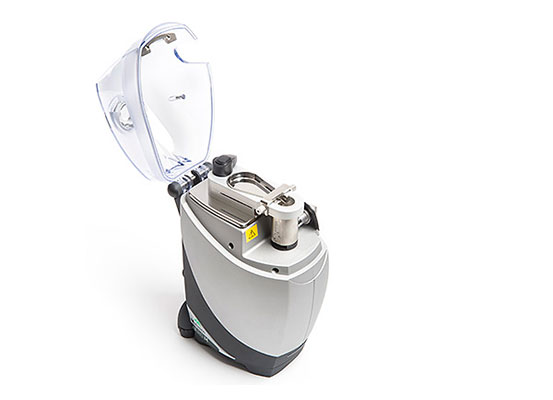
The Aero funnel sample feeder enables bulk samples of up to 15g to be loaded directly into the Aero S and Aero M dispersion units. This enables quick and consistent measurements of bulk powders.
- Simple sample preparation for bulk powder samples
- Analysis of large sample masses for reproducible measurements
- Measurement of free flowing materials such as coffee, as well as
cohesive samples such as calcium carbonate.
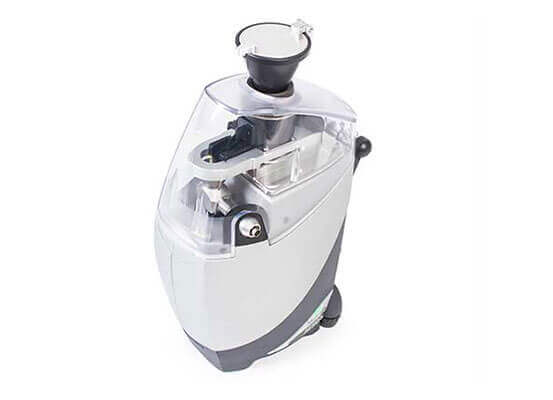
The Chocosizer kit optimises the workflow for the particle size measurement of chocolate cocoa and milk solids. It provides all the components required for chocolate QC methods.
- Develop a simple measurement workflow for QC operations
- Easily detect oversized particles which impact product perception
- Track particle size changes during chocolate processing
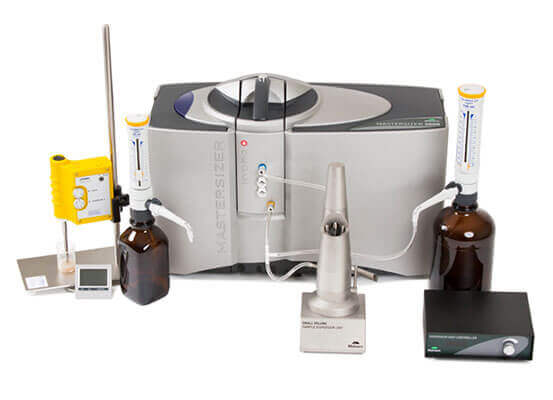
Performance Verification
Analysts can easily check the performance of the Mastersizer 3000+ dispersion units, with a low cost Quality Audit Standard (QAS). This comprises glass spheres polydispersed between 10 and 120 microns, packaged in ‘one-shot’ vials. These standards completely fulfil the recommendations of ISO 13320.
Hydro Insight – Capture images of the dispersion in real time

The Hydro Insight sits alongside the Mastersizer 3000+ series and is a dynamic imaging accessory providing real time visualisation and analysis of liquid particle dispersions. The images/videos allow an understanding of how stirring, sonication, and surfactants affect the dispersion.
- Visualise individual particle size and shape to better understand material behaviour and build confidence in product quality.
- See your dispersion as you develop your laser diffraction methods, for e.g. switching from sieving.
- Quickly troubleshoot unexpected results that may indicate the presence of contaminants or agglomerates.
Product Enquiry
SPEAK TO OUR AUSTRALIAN AND NEW ZEALAND TEAM
If you would like to enquire about this product, fill out this form and one of our product specialists will contact you shortly.
If you need help in the operation or repair of an instrument then please contact the Customer Help Centre directly.
Please note, product enquiries are only applicable to Australia, New Zealand, Papua New Guinea and Fiji
Or call us instead at (02) 9541 3500




 02 9541 3500
02 9541 3500
